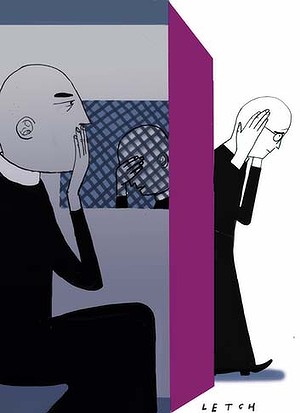It's Essential We Think outside the Confessional Box
By Waleed Aly
Who says politicians can't sing in unison? This week we've seen the full array of politicians - Green, Labor, Liberal and independent - lining up to dismantle the Catholic Church's institution of sealed confession. The idea that a priest could hear another priest's confession of child sex abuse, and fail to report it to the authorities is, says the Attorney-General, Nicola Roxon, "really abhorrent". The NSW Premier, Barry O'Farrell, "just can't fathom" it. The independent MP Nick Xenophon just slams it as "a medieval law that needs to change in the 21st century". No freedom of religion argument can succeed against this. The secular liberalism that defines our public culture simply won't accept it for one simple reason: religious freedom ends where harm to other people begins. And it's a rare kind of harm that is more horrific than children being raped. The church can argue all it likes that the confessional seal is "inviolable". But what obligation does the secular state have to canon law? What interest does the state have in ensuring people can receive absolution? The church simply has no answer to this. Hence the spectacle of practising Catholics like Tony Abbott and Christopher Pyne jumping on the anti-confessional bandwagon. There's just no politically viable alternative. But here's the problem: the whole issue of the confessional seal is a monstrous red herring. This becomes clear once you pay attention to the way politicians are talking about it. Xenophon recounts the story of a 10-year-old boy who told his story of being abused to a priest at a confessional, only to be told that he's the sinner and he needs to repent. If that's the full story, then Xenophon's right to call it "sickening", but it simply has nothing to do with the confessional seal. There's no confession from the abuser to reveal. The child is perfectly entitled to take his story to the police and the priest is perfectly entitled to help him do it. This case isn't about confidentiality. It's about a priest with a septic morality. I'd want that priest fired. I'd want the church to apologise, help prosecute the abuser, compensate the victim and make sure it never happens again. And breaking the seal of confession doesn't help any of that. Demanding laws that require priests to break the confessional seal sounds good. It sounds tough, uncompromising, commonsense. But it's also the kind of thing you do when you don't understand the problem you're trying to solve. That's what we're witnessing here: irreligious people trying to address a religious problem with brute secular force. That might make perfect intuitive sense to the staunchly secular mind, but we need more than intuition and declarations of secular supremacy here. What matters is what works. And taking an axe to the confessional box won't work. It might even make things worse. Advertisement The anti-confessional argument rests on an assumption that the confessions are taking place. Even if that's true there's no reason to assume they will keep coming. When people confess, they do so with a guarantee of confidentiality. Do we really think people will continue to confess if we take that guarantee away? And if the confessions stop, does that really help at all? The confessional seal means the priest cannot reveal the identity of the paedophile. But he can encourage the paedophile to turn himself in to the authorities or get psychiatric treatment. He could recommend the paedophile resign his position. He can even warn a third party that a particular child is at risk of abuse, provided he doesn't say from whom. Sure, that's not as satisfying as taking a sledgehammer to the abuser. But it's better than nothing. I'd rather the confession take place confidentially than not at all. But suppose I'm wrong. Suppose a paedophile's desire for absolution is so strong that they're prepared to take the risk and confess anyway. Then what? Canon law prohibits a priest from revealing a confession even under the threat of death. Should we expect them to buckle under the threat of a prison sentence? Here it's essential to understand that any priest who violates the confessional seal faces excommunication. That might mean nothing to you. You might even see this as the threat that underpins a dangerous fairy tale. But you're not the one hearing the confession. What matters is what this means to priests, and in Catholic terms, excommunication is as serious as it gets. This leaves us searching for a very strange creature: someone devoted enough to enter the priesthood, but not devoted enough to care about eternal damnation. And we need lots of them. We're betting on a team of rogue priests. That doesn't sound like a plan to me. You can't legislate away people's religious convictions. And you can't ignore them because you hold them in contempt. What matters here is the stuff outside the confessional box: the lame responses to abuse that seem calculated to protect paedophile priests rather than their victims; the legal manoeuvring to avoid paying compensation; the failure of police to follow through on investigations. These are the things we should be pursuing relentlessly. This should be the focus of our desire for justice. Let's not dilute that by getting lost on some doctrinal excursion it's clear we don't understand. []
|
.
Any original material on these pages is copyright © BishopAccountability.org 2004. Reproduce freely with attribution.
